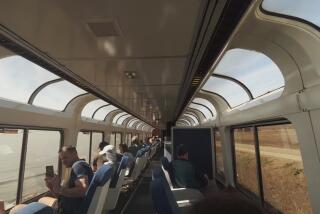Train Sign Fits an Old Song in a Fine Meter
- Share via
In recalling the little sign that used to be posted in the lavatories of passenger trains, before the jet airplane moved trains into the past, I seem to have stirred the memories of many Americans who remember that exhilarating age of locomotion.
As I recall it, the sign read like this:
Passengers must please refrain from flushing toilets while the train is standing in the station.
It was not rendered as verse, but it was such an unconsciously impeccable piece of trochaic tetrameter (I looked that up) that most people who ever encountered it remembered it forever as song. Not only are those words remembered as song, but they are remembered as a particular song--one that probably reached a peak of popularity in America in the 1920s.
“Try your line to the tune of ‘Humoresque,’ ” writes Sam Becker, “and add the following: ‘I love you.’ ”
Florence Rich writes that “Passengers must please refrain” brought back “fond memories of the . . . delights of childhood.”
She adds: “But this admonition was always sung by us to the familiar refrain from ‘Humoresque.’ You’ll find the lyric fits perfectly to the music, especially with adding ‘I love you’ at the end.”
“If you want to experience one of the great erotic happenings of your life,” adds Marshall L. Robbins, “please sing your closing bit of doggerel to the tune of Dvorak’s ‘Humoresque.’ I will be amazed if you don’t already know about this or if you haven’t heard from a few dozen other nutcakes.”
I did know about it, and I have heard from several other nutcakes.
Try singing it yourself to “Humoresque.”
Passengers must please refrain
From flushing toilets
While the train
Is standing in the station
I love you
Surely everyone remembers Dvorak’s “Humoresque,” especially as interpreted on those old 78 r.p.m. records by violinist Fritz Kreisler. It was one of the “classics” played for us on dreamy spring days in my high school music appreciation class.
Inevitably, any bit of verse that becomes folklore inspires vulgar or risque parodies. Mary Christner of Taft recalls one:
We went strolling in the park
And goosing statues in the dark
If Sherman’s horse can take it
Why can’t you?
By the way, Stephen H. Statham argues that the verse is not trochaic tetrameter, but iambic tetrameter--”predominantly, anyway.”
Sorry. I get trochaic tetrameter out of it. One man’s troch is another man’s iamb.
Meanwhile, my several quotations from the paperback “English Well Speeched Here” (Price/Stern/Sloan) have caused other readers to recall amusing English signs they encountered while traveling.
Stella Debow sends a classic of the genre, clipped from a travel brochure in Lisbon:
“Solmar, situated on the center’s town and to near of Rossio and Restaurades squares which are the most movemented and cosmopolite zones of the city, offers to the visitors the greatest facilities on their movements because near him are situated someones of the better traveling agencies and the railway station, the post office, and tourism.”
With that kind of advice, my wife and I shouldn’t have any trouble on our trip later this month to Portugal and Spain.
Colin S. Jackson says he could find no hotel vacancy at Marie de la Mer on the Mediterranean coast of France in 1985 and decided to camp near the beach. He threw down his sleeping bag and then noticed a sign posted in five languages, including English. In English, it said: “No wild camping allowed.”
I trust also that my wife and I will have no trouble with wild camping, whatever that is.
Martin E. Mullen Jr. remembers a sign on an elevator in the Slavia Hotel, in Belgrade, Yugoslavia, 20 years ago: “To move the cabin press the button of wishing floor.’
Perhaps the most embarrassing mistakes are in American signs. Celia Spivey of Big Bear Lake saw this one in a coffee shop: “No checks accepted. No acceptions!”
Janice Peters recalls a sign she saw on an English country road--an arrow-shaped sign that said “Thingly Only.” Moments later she realized it meant that that road led only to Thingly, and to nowhere else.
That was not foreign-English. That was English-English.
Which is sometimes Greek.
More to Read
Sign up for The Wild
We’ll help you find the best places to hike, bike and run, as well as the perfect silent spots for meditation and yoga.
You may occasionally receive promotional content from the Los Angeles Times.






